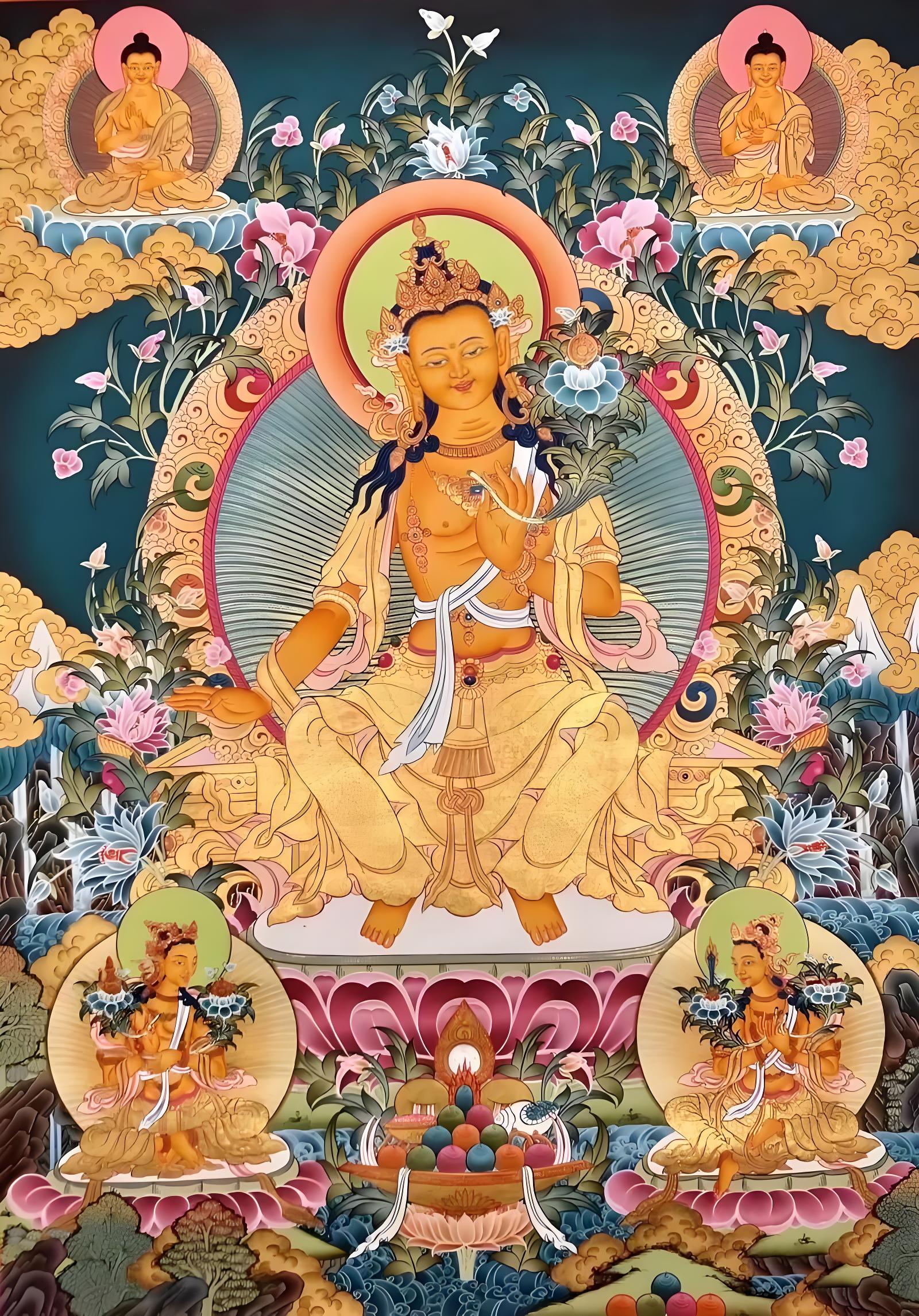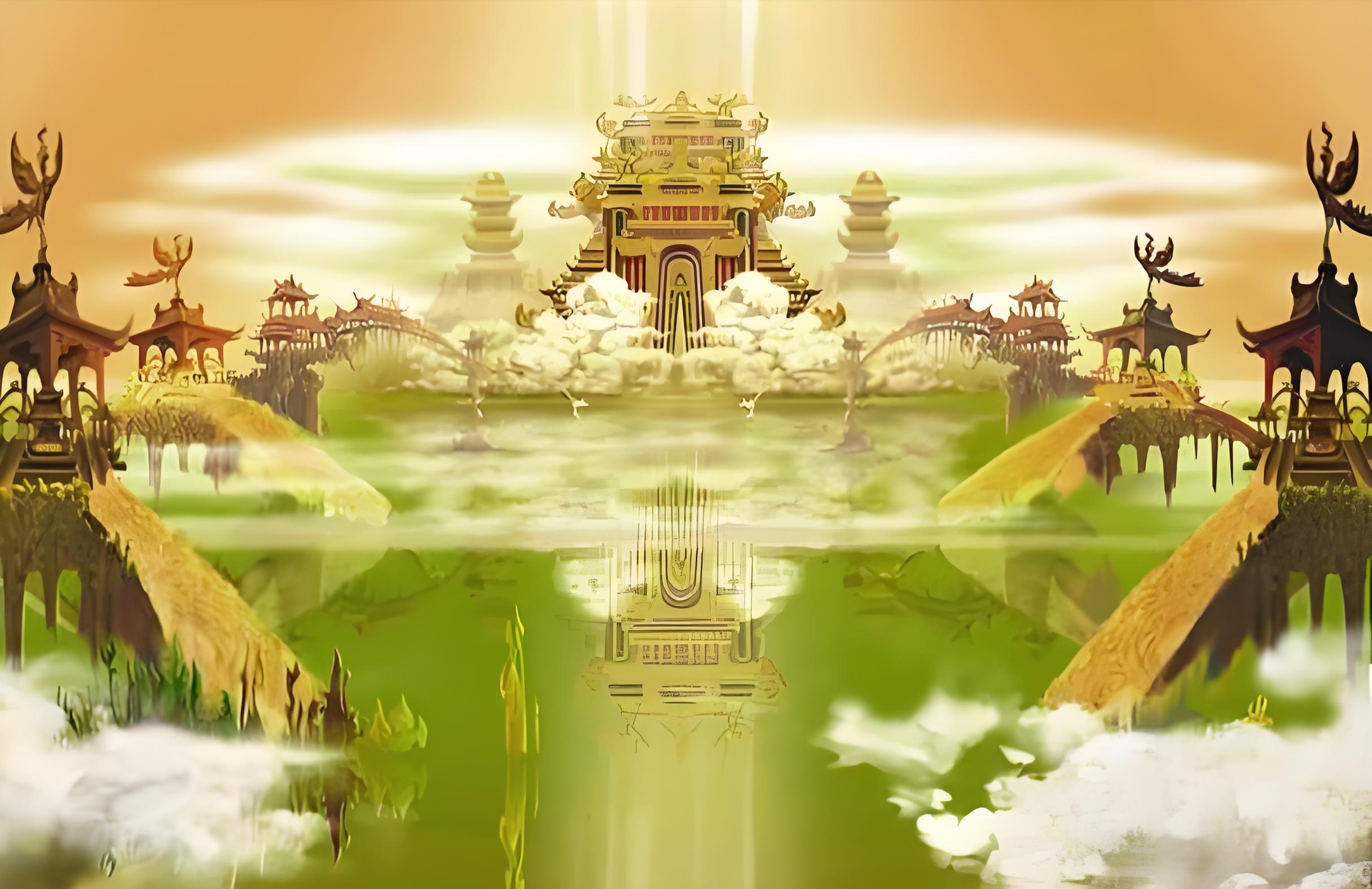Maitreya, meaning “benevolent one,” is a bodhisattva in Buddhism, a being on the path to Buddhahood, one step below a fully enlightened Buddha. According to the Maitreya’s Descent Sutra and the Maitreya’s Rebirth Sutra, he was born into a high-class Brahmin family in the village of Kapila in South India. His surname was “Maitreya,” and his given name was “Ajita,” meaning “invincible.” In the Commentary on the Amitabha Sutra, Kuiji explains: “Maitreya is also called ‘the Benevolent One’. Because he cultivates a compassionate heart and enters into meditative absorption of compassion, he is called the Benevolent One. He is supreme in cultivating compassion, hence the name ‘Invincible’.” He later became a disciple of Shakyamuni Buddha, listening to his teachings. Shakyamuni Buddha prophesied that Maitreya would inherit his position, becoming the future Buddha and his rightful successor.
Maitreya’s Heavenly Abode
Maitreya, having achieved enlightenment, will pass away before Sakyamuni Buddha, ascending to Tusita Heaven to enjoy its blissful realms. According to Buddhist cosmology, all sentient beings are within the three realms of desire, form, and formlessness, experiencing cycles of birth and death. Only by achieving Nirvana and becoming a Buddha can one transcend these realms and ascend to the Western Pure Land, a realm of eternal peace. The Western Pure Land is a Buddha realm, while the “three realms” are considered the mundane world.
The desire realm is the lowest of the three realms, and it includes the six paths, from the lowest to the highest: hell, hungry ghosts, animals, asuras (evil spirits), humans, and gods. Here, “gods” doesn’t refer to the sky as we understand it, but rather the higher realms where beings superior to humans live. There are six heavens in the desire realm. The first is the Heaven of the Four Kings, located on the waist of Mount Sumeru, the great mountain at the center of the world, where the four great heavenly kings (also known as the Four Vajras) reside. The second is the Heaven of the Thirty-Three, located at the summit of Mount Sumeru. At the center is Indra, and there are eight heavens on each of the four surrounding peaks, totaling thirty-two heavens. Together with Indra’s central heaven, they form the thirty-three heavens. The ruler of this heaven is Indra. The third is the Yama Heaven, located 80,000 yojanas above the Heaven of the Thirty-Three. This heaven has no night and is eternally bright. The fourth is the Tusita Heaven, located 160,000 yojanas above the Yama Heaven. The fifth is the Nirmanarati Heaven, located 320,000 yojanas above the Tusita Heaven. The sixth is Paranirmitavasavartin Heaven, located 640,000 yojanas above the Nirmanarati Heaven.
The Tusita Pure Land: Maitreya’s Paradise
In Buddhist scriptures, Tusita Heaven is Maitreya’s paradise. Tusita, a transliteration of the Sanskrit word “Tusita,” means “joyful” or “contented.” Some scriptures place it 320 million yojanas above the Yama Heaven. One day and night there is equivalent to 400 years on Earth. Similar to the old saying, “The prince went to seek immortality; after refining the elixir, he entered the Ninth Heaven. Just seven days within the cave, several millennia passed on Earth.” Buddhist scriptures describe the inhabitants of this heaven as radiating light that illuminates the world. It’s said that this heaven has an inner and outer court. The outer court is a park and playground for gods, while the inner court is Maitreya’s “pure land” in the desire realm. This place, according to the scriptures, is where the “bodhisattva-in-waiting” resides. What does “in-waiting” mean? The Profound Meaning of Avalokiteśvara states: “’In-waiting’ means that the previous Buddha has entered Nirvana, and this bodhisattva is there to take over, therefore he is ‘in-waiting’.” In modern terms, it is a “retirement home for future Buddhas”. Sakyamuni Buddha’s mother, Maya, was reborn here after death. Maitreya, being Sakyamuni’s designated successor, naturally resides in this “retirement home” to prepare.
The Splendor of Tusita Pure Land
The beauty of the “Tusita Pure Land” has been portrayed with incredible detail: with 50 billion jeweled palaces (remarkably, if calculated by the population at that time, each person would have one hundred palaces, and even by today’s population, each person would have ten palaces!), 50 billion heavenly women, and musical instruments that play celestial melodies. The heavenly women play these instruments and dance. The descriptions are overwhelmingly wondrous.
The “Buddha Land” that will manifest when Maitreya becomes a Buddha is even more breathtaking: there, grains are abundant and cheap, people are knowledgeable and prosperous, and precious treasures such as gold, silver, agate, pearls, and amber are scattered on the ground, uncollected, as if they were mere pebbles. The land is extremely flat, as clear as a mirror, and fragrant with perfumed water. The climate is pleasant, with four harmonious seasons. Furthermore, “rice grows naturally in the land without husks and is extremely fragrant and delicious.”
Even more wonderfully, “when men and women wish to relieve themselves, the ground opens naturally, and closes up again after they are finished”. Even toilets are unnecessary. This display of imagination is certainly admirable. It also provokes thoughts of whether the “outer space beings'” (aliens’) advanced lives are like this.
Rebirth in the “Tusita Pure Land” is captivating, and indeed has fascinated many. Daoan, a highly respected monk of the Eastern Jin Dynasty in Chinese Buddhist history, vowed to be reborn in the Tusita Pure Land. According to legend, before his death, Daoan dreamt of the long-browed Arhat Pindola Bharadvaja, one of the eighteen arhats. Daoan asked where he was going. The Arhat gestured to the northwest sky, and the clouds parted to reveal the beautiful realm of Tusita. The Arhat had come to receive him. Xuanzang, the eminent monk of the Tang Dynasty, also yearned for the Tusita Pure Land. At his death, he constantly chanted Maitreya’s name, hoping to reside in the “inner court of Tusita”. Bai Juyi, the lay Buddhist poet, also believed in the Maitreya Pure Land in his later years, burning incense before the Buddha daily and vowing, “May I, in the future, ascend to Tusita with all beings, descend with the Benevolent One, be with the Benevolent One in life after life, forever free from the cycle of birth and death, and ultimately attain the supreme path.”


